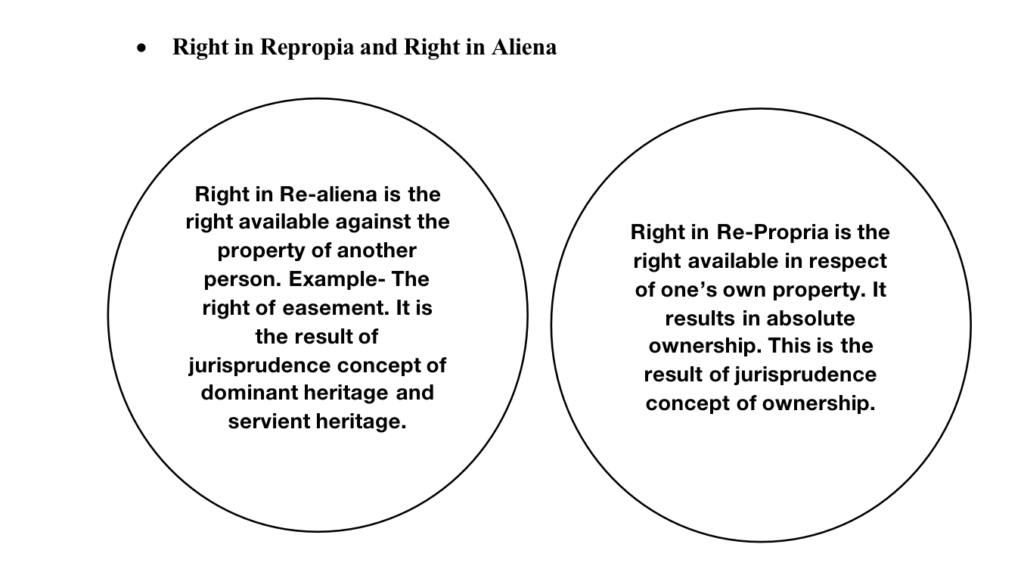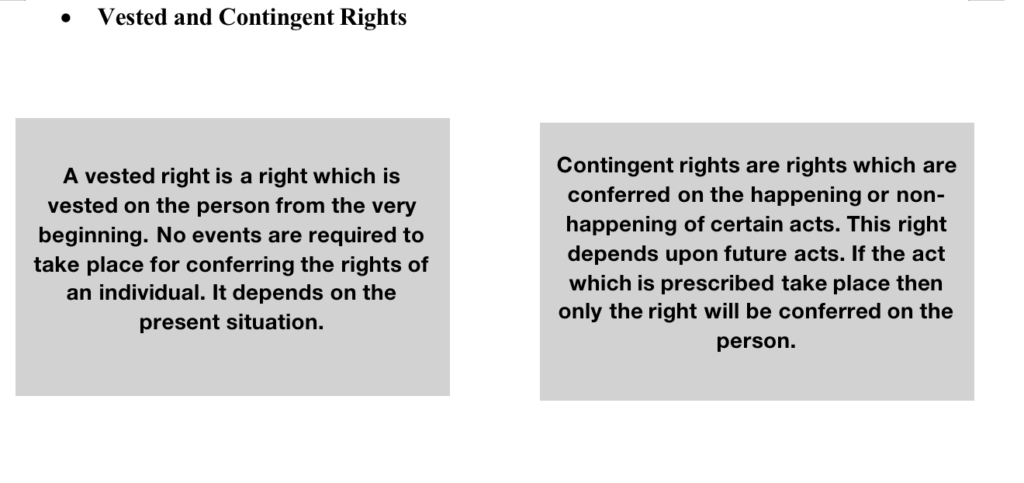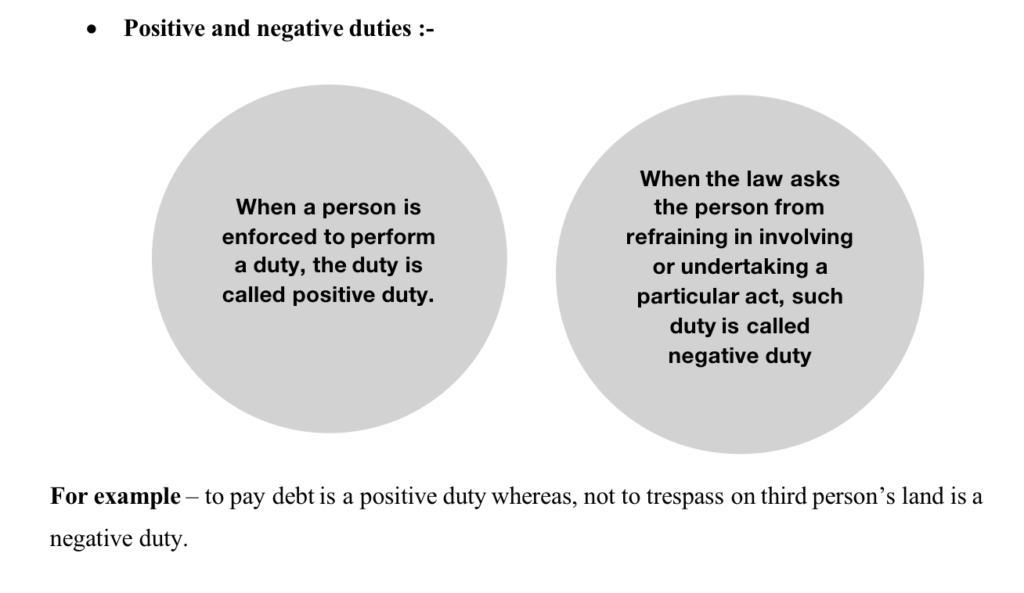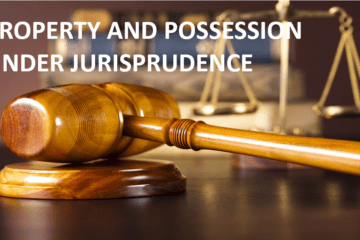
LEGAL RIGHTS AND DUTIES
Meaning of Right

According to Salmond:
A legal right is an “interest which is protected and recognized by the rule of law. It is an interest which has its duty and disregard of which is wrong”.
According to Gray:
A legal right is “that power which the man has, to make a person or persons to do or restrains from doing a certain act or acts so far as the power arises from society imposing a legal duty upon the person or persons. He states that the “right is not the interest itself, it is the means to enjoy the interest secured”.
In the case of State of Rajasthan vs Union of India, the Supreme Court stated that “Legal rights in the strict sense are correlatives of legal duties and legal rights are defined as the interests which the law protects by imposing duties on other persons. But the legal right in the strict sense means right is the immunity from the legal power of another. Immunity is no subjection at all”.
Essential conditions of legal right
According to Salmond, there are five essential conditions that need to be fulfilled:
- The person of inheritance/ Subject of right:
He shall be the person who is the owner of the right. He is the subject of the legal right. Such a person is called a person of inheritance. Example:-Y purchase a van for Rs 20,000. Here Y is the subject of the right.
- The subject of duty/ the person of incidence:
It is the duty of another person or persons to respect and recognize the right of the person. Such a person who has a legal duty is called a person of incidence. Example– If A has a legal right against B, then it is the duty of B to respect the right of A.
- Contents or Subject Matter of legal right:
The subject matter of legal right is an essential element. It deals with the subject matter of the legal right. It is related to do something or to refrain from doing certain acts or forbearance. It obligates the person to forbear or act in favour of the person possessing a legal right. Example-Y purchase a van for Rs 20,000. Here Y is the subject of the right. The subject matter ( Y) has a legal right and he can exclude others.
- The object of the legal right:
The object of the legal rights is a thing or object over which the legal right is exercised. Example– A purchases the car for Rs 1,00,000. Here the car is the object.
- Title of the legal right:
The title is the process by which the right is vested or conferred on the person. It is certain events by which right is acquired from its previous owner. Example– By purchase or gift or will etc.
Theories Related To The Legal Right
- Will theory
- Interest theory
- Theory of Duguit

Classification of Legal Right
- Salmond gave following classifications of rights.
- Positive and Negative Rights
- Real and Personal Rights
- Right in rem and right in personam
- Proprietary and Personal Rights
- Inheritable and Uninheritable Rights
Salmond’s Classification of Positive and Negative Rights
| Positive Rights | Negative Rights | |
| 1 | A positive right corresponds to a corresponding duty and entitles its owners to have something done for him without the performance of which his enjoyment of the right is imperfect. | Negative rights have negative duties corresponding to them and enjoyment is complete unless interference takes place. Therefore, majority of negative rights are against the entire world. |
| 2 | In the case of positive rights, the person subject to the duty is bound to do something. | Whereas, in case of negative rights, others are restrained to do something. |
| 3 | The satisfaction of a positive right results in the betterment of the position of the owner. | Whereas in case of a negative right, the position of the owner is maintained as it is. |
| 4 | In case of positive rights, the relation between subject and object is mediate and object is attained with the help of others. | Whereas in case of negative rights, the relation is immediate, there is no necessity of outside help. All that is required is that others should refrain from interfering case of negative rights. |
| 5 | In case of positive rights, a duty is imposed on one or few individuals. | In case of negative rights, the duty is imposed on a large number of persons. |
Salmond’s Classification of Real and Personal Rights
| Real Rights | Personal Rights | |
| 1 | A real right corresponds to a duty imposed upon persons in general. | A personal right corresponds to a duty imposed upon determinate individuals. |
| 2 | A real right is available against the whole world. | A personal right is available only against a particular person. |
| 3 | All real rights are negative rights. Therefore, a real right is nothing more than a right to be left alone by others. It is merely a right to their passive non-interference. | Most personal rights are positive rights although in a few exceptional cases they are negative. |
| In real right, the relation is to a thing. Real rights are derived from some special relation to the object. | In personal right, it is the relation to other persons who owe the duties which is important. Personal rights are derived from special relation to the individual or individuals under the duty. | |
| 4 | Real rights are right in rem. | Personal rights are right in personam. |
Salmond’s Classification of Right in rem and Right in personam
| Right in rem | Right in personam | |
| 1 | It is derived from the Roman term ‘actio in rem’. An action in rem was an action for the recovery of dominium. | It is derived from the Roman term ‘action in personam’. An action in personam was one for the enforcement of obligato i.e. obligation. |
| 2 | The right protected by an action in rem came to be called jus in rem. | A right protected by action in personam came to be called as jus in personam. |
| 3 | Jus in rem means a right against or in respect of a thing. | Jus in personam means a right against or in respect of a person. |
| 4 | A right in rem is available against the whole world. | A right in personam is available against a particular individual only. |
Salmond’s Classification of Proprietary and Personal Rights
| Proprietary Rights | Personal Rights | |
| 1 | Proprietary rights means a person’s right in relation to his own property. Proprietary rights have some economic or monetary value. | Personal rights are rights arising out of any contractual obligation or rights that relate to status. |
| 2 | Proprietary rights are valuable. | Personal rights are not valuable. |
| 3 | Proprietary rights are not residual in character. | Personal rights are the residuary rights which remain after proprietary rights have been subtracted. |
| 4 | Proprietary rights are transferable. | Personal rights are not transferable. |
| 5 | Proprietary rights are the elements of wealth for man. | Personal rights are merely elements of his well-being. |
| 6 | Proprietary rights possess not merely judicial but also economic importance. | Personal rights possess merely judicial importance. |
Salmond’s Classification of Inheritable and Uninheritable Rights
| Inheritable Rights | Uninheritable Rights |
| A right is inheritable if it survives the owner. | A right is uninheritable if it dies with the owner. |
- Perfect and Imperfect Rights
Perfect rights are protected and recognized by law and the suit can be instituted in the court against the wrongdoer for the breach of it. Example: A has taken the loan from B. B has the duty to pay the loan and A has the perfect right to claim the loan amount. If B fails to pay then A has the right to file the suit in the court.
Imperfect rights are those rights which are neither recognized nor protected by law. Example: if the loan becomes time-barred, then he can claim his money back but it cannot be enforced by law.

- Vested and Contingent Rights

Meaning of Duties
As Birds are made to Fly and Rivers to Run, So the Soul to Follow Duty. – Ramayana
Duty, the word finds its derivation from the word “due” which means something which owed. So, Duty can be described as an obligation to perform an act or a task. This act or task can be ethical, moral, cultural etc. in nature or either a compulsion by the state, omission of which will result in punishment by law. Cicero, an early Roman philosopher who discusses duty in his work “On Duty”, suggests that duties can come from four different sources:-
- As a result of being a human
- As a result of one’s place in life (one’s family, one’s country, one’s job)
- As a result of one’s character
- As a result of one’s own moral expectations for oneself.

According to Salmond ”A duty is an obligatory act, it is an opposite of which would be wrong. Duties and wrongs are correlatives. Supporting this, Fitzgerald has said, the commission of wrong is breach of duty and performance of duty is avoidance of wrong.
According to Keeton, a duty is an act of forbearance which is enforced by the state in respect of a right vested in another and breach of which is a wrong act.
According to Prof. Dicey, ” a duty is a species of obligation. People obey it due to indolence, deference, sympathy, fear and reason. And due to psychological, social and moral pressures. Most duties are supported by State. The breach of the duty is imprisonment or fine.”
Characteristics of Duties
A duty is a responsibility to be fulfilled. It is the guideline, a prescription to be followed which details the conduct which must be followed when fulfilling duties which are moral or social in nature. Professor Fuller states the main attributes of duty as :-
- It should be general, though limited exceptions are permissible.
- It should be promulgated.
- It should be prospective and intelligible.
- It must be consistent.
- It should be capable of fulfillment and congent with inner morality.
Classification of Duties
Legal and moral duties :-


- Primary and secondary duties :–
| Primary duty is one which doesn’t need to be statedit exists on its own. | Secondary duty is one which exists only for giving the way to other duties thus, having no independent existence. |
For example – Not to cause injury to another person is the primary duty, but to pay damages as a result of injury caused is the secondary duty.
Absolute and relative duties :-

Correlation between Rights and Duties
Rights and duties have a close relationship and both are inseparable. Both are existing side by side. One can say that right and duty are the two sides of the same coin. If a legal system gives the right to life to its citizen, it also imposes an obligation on him to not to expose his life in trouble, as well as to respect the life and convenience of others. Thus, a strong legal system shall consist of Legal Rights and Legal Duties like its two non-separable parts.
- According to Salmond “no right can exist without any corresponding duty and vice versa.” He believed that every duty which is being performed is in respect of a correlated right attached to it.
- Austin has to say is that all the types of duties are not similar and they are divided between relative and absolute duty. Relative duties are the one which have corresponding rights whereas Absolute duties are the one which are independent and have no rights correlated to them. For example, not to commit suicide, is one of your absolute duty, there is no corresponding right here.





0 Comments